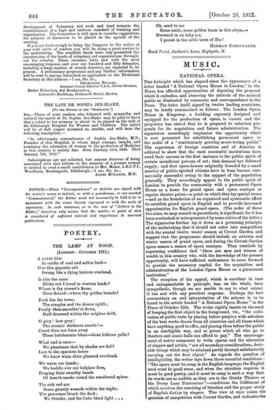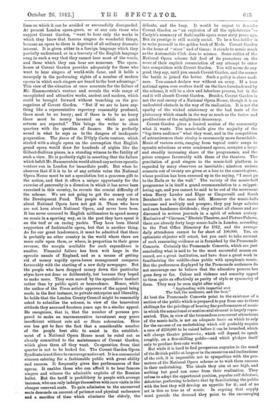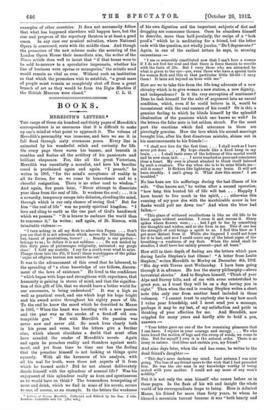M USI C.
NATIONAL OPERA.
THE fortnight which has elapsed since the appearance of a letter headed "A National Opera House in London," in the Times, has afforded opportunities of digesting the proposal which it embodies, and observing the attitude of the musical public as illustrated by comments and correspondence in the Press. The letter• itself, signed by twelve leading musicians, may be briefly summarized as follows : The London Opera House in Kingsway, a building expressly designed and equipped for the production of opera, is vacant, and the proprietor has stated that he is prepared to entertain pro- posals for its acquisition and future administration. The signatories accordingly emphasize the opportunity which is now presented for establishing permanent opera in the midst of a "continuously growing music-loving public." The experience of foreign countries and of America is adduced to show that the most successful institutions have owed their success in the first instance to the public spirit of certain munificent patrons of art ; that demand has followed supply ; and that opera-houses originally founded by a small number of public-spirited citizens have in time become com- mer•cially successful owing to the support of the population generally. They accordingly appeal to the public spirit of London to provide the community with a permanent Opera House as a home for grand opera and opera comique at regular• theatre prices—a point on which they lay special stress —and as the foundation of an organized and systematic effort to establish grand opera in English and to provide increased opportunities for English grand opera. (The order of these two aims, we may remark in parenthesis, is significant, for• it has been overlooked or misrepresented by some critics of the letter.) The signatories further lay it down as a governing principle of the undertaking that it should not enter into competition with the annual twelve weeks' season at Covent Garden, and suggest that the programme should include an autumn and winter season of grand opera, and during the Covent Garden opera season a season of opera comique. They conclude by expressing confidence that " there are men and women of wealth in this country who, with the knowledge of the present opportunity, will have sufficient enthusiasm to come forward to provide the necessary capital for• the acquisition and administration of the London Opera House as a permanent institution."
The reception of the appeal, which is excellent in tone and unimpeachable in principle, has, on the whole, been sympathetic, though we are unable to say to what extent it has met with any practical response. Perhaps the best commentary on and interpretation of the scheme is to be found in the article headed " A National Opera House " in the Times of October 12th. The writer rightly insists on the need of keeping the first object in the foreground, viz., "the culti- vation of public taste by placing before people a wide selection of the best works drawn from all countries and all times which have anything good to offer, and placing them before the public in an intelligible way, and at prices which all who go to theatres and music-halls can afford to pay." The encourage- ment of native composers to write operas and the education of singers and artists, " are all secondary considerations, desir- able things which may be attained partly through satisfactorily carrying out the first object." As regards the question of intelligibility, the writer lays down three essential conditions : " The opera must be sung in the English language, the English used must be good sense, and when the situation requires it must be good poetry, and it must be sung in such a way that
its words are as audible as they are in the Gaiety Theatre or the Drury Lane Pantomime "—conditions the fulfilment of which involves the rewriting of librettos and the proper study of English diction by singers. This view at once raises the question of competition with Covent Garden, and indicates the
lines on which it can be avoided or successfully disregarded. At present London opera-goers, or at any rate those who support Covent Garden, " want to hear only the works in which they know that famous singers do wonderful things, because an opera to them is deprived of all ordinary dramatic interest. It is given either in a foreign language which they partially understand, or in a travesty of the English language sung in such a way that they cannot hear most of the words, and those which they can hear are nonsense. The opera- house at Covent Garden provides adequately for those who want to hear singers of world-wide fame, and it holds a monopoly in the performing rights of a number of modern operas in which such singers are heard to the best advantage." This view of the situation at once accounts for the failure of Mr. Hammerstein's venture and reveals the wide range of unexploited and attractive works, ancient and modern, which could be brought forward without trenching on the pre- rogatives of Covent Garden. "But if we are to have any- thing like a representative repertory reasonably produced, there must be no hurry; and if there is to be no hurry there must be money invested on which no quick returns are expected." This brings the writer to close quarters with the question of finance. He is perfectly sound in what he says as to the dangers of inadequate preparation. The fiasco of the D'Oyly Carte venture, which started with a single opera on the assumption that English grand opera would draw for hundreds of nights like the Gilbert-Sullivan pieces, is a standing witness to the futility of such a view. He is perfectly right in asserting that the failure which befell Mr. Hammerstein would attend any serious operatic venture run in London for immediate profit. But when he observes that if it is to be of any artistic value the National Opera House must be not a speculation but a generous gift to the nation, and that it offers a unique opportunity for the exercise of generosity in a direction in which it has never been exercised in this country, he reveals the crucial difficulty of the scheme. We are not going to get the money out of the Development Fund. The people who are really keen about National Opera have not got it. Those who have are not keen about National Opera, and never have been. It has never occurred to English millionaires to spend money on music in a sporting way, as in the past they have spent it on the turf or on racing yachts. They have been liberal supporters of fashionable opera, but that is another thing. As for our great landowners, it must be admitted that there is probably no other country in the world where there are more calls upon them, or where, in proportion to their gross revenue, the margin available for such expenditure is smaller. Financial failure has been writ large in the operatic annals of England, and as a means of getting rid of money rapidly opera-house management compares favourably with the starting of a new daily newspaper. But the people who have dropped money down this particular abyss have not done so deliberately, but because they hoped to make more. They were moved by the speculative instinct rather than by public spirit or benevolence. Hence, while the author of the Times article approves of the appeal being made, in the first instance, to private enterprise and liberality, he holds that the London County Council might be reasonably asked to subsidise the scheme, in view of the benevolent attitude they assumed fourteen years ago to a similar appeal. He recognizes, that is, that the number of persons pre- pared to make an unremunerative investment may prove insufficient without rate aid or State subvention. Here one has got to face the fact that a considerable number of the people best able to assist in the establish- ment of a National Opera House must be ruled out as already committed to the maintenance of Covent Garden, which gives them all they want. Co-operation from that quarter is not to be looked for. The Covent Garden Opera Syndicate isnot there to encourage native art. It is a commercial concern catering for a fashionable public with great ability and success. It frequently gives fine performances of fine operas.. It enables those who can afford it to hear famous singers and witness the admirable exploits of the Russian ballet. But the tariff is prohibitory to people with average incomes, who can only indulge themselves with rare visits in the cheaper reserved seats. To gain admission to the unreserved seats demands an amount of patience and physical endurance and a sacrifice of time which eliminate the elderly, the delicate, and the busy. It would be unjust to describe Covent Garden as " an explosion of all the upholsteries "— Carlyle's summary of fashionable opera some sixty years ago. But its prestige is still mainly social. To be a box-holder is to write yourself in the golden book of Mode. Covent Garden is the home of " stars " and of tiaras it stands to music much as the Automobile Club does to science. Some critics of the National Opera scheme fall foul of its promoters on the score of their explicit renunciation of any attempt to enter into competition with Covent Garden. You will never do any good, they say, until you smash Covent Garden, and the sooner the battle is joined the better. Such a policy is sheer mad- ness. You cannot declare war without an army. If a true national opera ever evolves itself on the lines foreshadowed by the scheme, it will be a slow and laborious process, but in the end it will absorb Covent Garden. Besides, Covent Garden is not the real enemy of a National Opera House, though it is an undoubted obstacle in the way of its realization. It is not the apathy of the wicked aristocracy or the bad taste of the plutocracy which stands in the way so much as the tastes and predilections of the enlightened democracy.
Covent Garden gives a limited section of the community what it wants. The music-balls give the majority of the "big-town audience" what they want, and in the competition of attractiveness their rivalry is enormously more formidable. Music of various sorts, ranging from topical comic songs to operatic selections or even condensed operas, occupies a large and steadily increasing share of the programmes, and the prices compare favourably with those of the theatres. The gravitation of good singers to the music-hall platform is regarded by many observers as inevitable ; nineteen serious
concerts out of twenty are given at a loss to the concert•giver, whose position has been summed up in the saying, "I must go to the Halls or to the wall." The variety of the music-hall programme is in itself a grand recommendation to a snippet- loving age, and you cannot be said to be out of the movement when Harry Lauder and Elgar or Cinquevalli and Sarah Bernhardt are in the same bill. Moreover the music-halls increase and multiply and prosper; they pay large salaries and earn handsome dividends ; they attract all classes and are discussed in serious journals in a spirit of solemn ecstasy. Exclusive of "Cinemas," Electric Theatres, and Picture Palaces, there are already forty large music-halls in London, according to the Post Office Directory for 1912, and the average daily attendance cannot be far short of 100,000. Yes, an optimistic objector will retort, but you omit to take account of such reassuring evidence as is furnished by the Promenade Concerts. Certainly the Promenade Concerts, which are just concluding what is said to be the most successful season on record, are a great institution, and have done a great work in familiarizing the middle-class public with symphonic music. But the preferences displayed by the Promenade audiences do not encourage one to believe that the educative process has gone deep or far. Colour and violence and sonority appeal to them quite as effectively as purity of style or symmetry of form. They may be seen night after night
" Applauding with impartial zest
The bad, the mediocre, and the best."
At best the Promenade Concerts point to the existence of a section of the public which is prepared to pay from one to three shillings for the privilege of hearing fine performances of music in which the sensational or sentimental element is largely repre- sented. This, in view of the tremendous concurrent attractions of the music-halls, is not an adequate basis on which to rely for the success of an undertaking which will probably require a sum of 0250,000 to be raised before it can be launched, which will charge theatre prices—i.e., which will depend, to speak roughly, on a five-shilling public—and which pledges itself only to produce first-rate works. But while it is hard to find prosperous auguries in the mood of the British public at large or in the resources and inclinations of the rich, it is impossible not to sympathize with the pro- moters of the National Opera scheme or to wish them success in their undertaking. The ideals they aim at are high, and nothing but good can come from their realization. They refuse to adopt the opportunist position, poptaus cult delectari, delectetur, preferring to believe that by familiarizing the public with the best they will develop an appetite for it; and of no art is this so true as of music. In arguing that supply must precede the demand they point to the encouraging examples of other countries. It does not necessarily follow that what has happened elsewhere will happen here, but the rise and progress of the repertory theatres is at least a good omen. In any case our musical salvation, where National Opera is concerned, rests with the middle class. And though the promoters of the new scheme make the securing of the London Opera House their immediate aim, the writer of the Times article does well to insist that " if that house were to be sold to-morrow to a speculative impresario, whether his line of business were operas or menageries," the artistic need would remain as vital as ever. Without such an institution as that which the promoters wish to establish, "a great mass of people must remain as completely shut off from a great branch of art as they would be from the Elgin Marbles if
the British Museum were closed." C. L. G.




















































 Previous page
Previous page